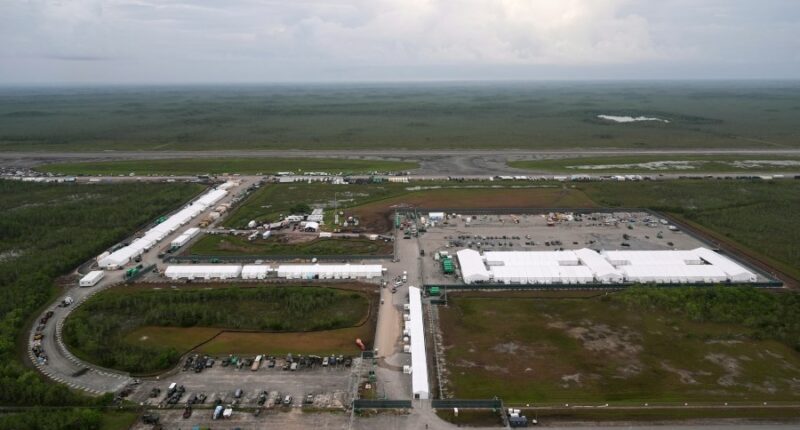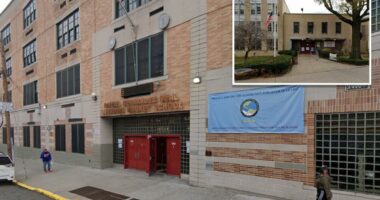Share this @internewscast.com

A federal judge in Miami has issued a preliminary injunction to stop further expansion of an immigration detention center called “Alligator Alcatraz,” located in the Florida Everglades. This center has been criticized by advocates for allegedly violating environmental laws.
Judge Kathleen Williams made the injunction official after temporarily halting the project two weeks prior. This decision comes as a multiday hearing is ongoing to determine whether construction should be suspended until the case is resolved.
The judge’s order anticipates the facility’s population will decrease within 60 days, with detainees being transferred elsewhere. Subsequently, fencing, lighting, and generators should be dismantled. She specified that no new detainees could be brought into the center. However, modifications or repairs that enhance safety or mitigate risks are allowed.
The injunction also extends to those collaborating with the state of Florida or federal parties involved, as noted in Judge Williams’ extensive 82-page order.
Judge Williams criticized state officials for failing to justify the choice of the Everglades as the facility’s location. She pointed out that alternative sites were not considered in their rush to build the detention center.
Responses from attorneys representing environmental groups, as well as those for state and federal parties, were not immediately available following these developments.
President Donald Trump toured the facility last month and suggested it could be a model for future lockups nationwide as his administration races to expand the infrastructure necessary for increasing deportations.
Environmental groups and the Miccosukee Tribe had argued that further construction and operations should be stopped until federal and state officials complied with environmental laws. Their lawsuit claims the project threatens environmentally sensitive wetlands that are home to protected plants and animals and would reverse billions of dollars’ worth of environmental restoration.
Attorneys for the state and federal governments argued that, although the detention center would be holding federal detainees, the construction and operation of the facility was entirely under the state of Florida, meaning the federal environmental law didn’t apply.
The judge has said the detention facility was, at a minimum, a joint partnership between the state and federal government.
The detention center was quickly built almost two months ago at a lightly used, single-runway training airport in the middle of the Everglades. It currently holds several hundred detainees but was designed to eventually hold up to 3,000 detainees in temporary tent structures.
Inside the compound’s large white tents, rows of bunkbeds are surrounded by chain-link cages. People held there say worms turn up in the food, toilets don’t flush and flood floors with fecal waste, while mosquitoes and other insects are everywhere. At times the air conditioners abruptly shut off in the sweltering heat. Detainees are said to go days without showering or getting prescription medicine, and can only speak to lawyers and loved ones by phone.
Witnesses for the environmental groups testified during the hearing that at least 20 acres (8 hectares) of asphalt had been added to the site since the Florida Division of Emergency Management began construction. They said additional paving could lead to an increase in water runoff to the adjacent wetlands, spread harmful chemicals into the Everglades and reduce the habitat for endangered Florida panthers.
Amy Castaneda, the Miccosukee Tribe’s water resource director, testified that nutrient runoff from the detention center could flow into tribal lands, changing vegetation growth. That could lead to fish kills and block humans and wildlife from moving throughout certain areas, she said.
Department of Highway Safety and Motor Vehicles executive director David Kerner testified that the federal government doesn’t tell the state where to detain immigrants, and that the Everglades facility was built to alleviate overcrowding at federal immigration detention facilities, as well as state and county facilities with agreements to hold federal immigration detainees.
Under the 55-year-old federal environmental law, federal agencies should have examined how the detention center’s construction would impact the environment, identified ways to minimize the impact and followed other procedural rules such as allowing public comment, according to the environmental groups and the tribe.
It makes no difference that the detention center holding hundreds of detainees was built by the state of Florida since federal agencies have authority over immigration, the suit said.
Attorneys for federal and state agencies have asked Williams to dismiss or transfer the injunction request, saying the lawsuit was filed in the wrong jurisdiction. Williams ruled Thursday that her court was the proper venue.
The lawsuits were being heard as Florida Republican Gov. Ron DeSantis ′ administration apparently was preparing to build a second immigration detention center at a Florida National Guard training center in north Florida.
















